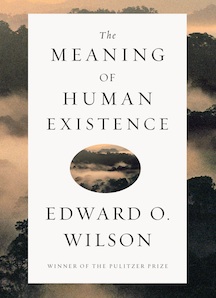By Alex Silverman
In Edward O. Wilson’s new book, The Meaning of Human Existence (W.W. Norton, 2014), the Pulitzer-prize winning biologist shows his artsy side. Calling for a long overdue bridge between the sciences and humanities, Wilson endears himself to English majors everywhere. But that’s not all his new book has. In the National Book Award nonfiction finalist, the Harvard professor emeritus discusses, among other things, his view of religion, extra-terrestrial visitation, and ants. (Surprisingly not a ‘which one doesn’t belong’ question.)
At first an odd grouping of subject matter, Wilson’s book actually ties together his varying expertise and interests. As Dwight Garner from The New York Times puts it, “Mr. Wilson’s slim new book is a valedictory work. The author… chews over issues that have long concentrated his mind: the environment; the biological basis of our behavior; the necessity of science and humanities finding common cause; the way religion poisons almost everything; and the things we can learn from ants, about which Mr. Wilson is the world’s leading expert.”
Wilson proposes that the humanities are of benefit to—of all things—aliens. (Ironic? Yes.) Wilson details a theoretical play-by-play for the arrival of alien life to our world. According to Wilson, if E.T.s did touchdown—whether by means of gentle descent onto a potato farm in rural Kansas or through the pulverization of a manicured backyard in middle class suburbia, their modus operandi would remain the same. The aliens would engage not with our planet, but our culture. Our novels, music, dances, everything from Shakespeare to the Beatles, to the inscrutable machinations of Dadaism would be their objective.
Affectionately referred to as “the father” of the twin children biodiversity and sociobiology, Wilson reserves a space in his book for his life’s passion: the genus Formica. Wilson admits that due to his lives fascination with ants, he is often asked two probing questions. The first regards what to do with an ant infestation in the kitchen, and the second concerns lessons learned from the minuscule species. “What can we learn of moral value from the ants?” Wilson writes. “Nothing. Nothing at all can be learned from ants that our species should even consider imitating.” But that doesn’t mean we can’t enjoy reading about them—Wilson writes of ants’ savage nature, cannibalistic tendencies, and severe lack of chivalry. “Where humans send their young men to war, ants send their old ladies.”
His stance on religion is just as unflinching. “The great religions are sources of ceaseless and unnecessary suffering. They are impediments to the grasp of reality needed to solve most social problems in the real world. Faith is the one thing that makes otherwise good people do bad things,” Wilson writes.
In true natural scientist-like fashion, Wilson does his job to make us feel both small and and giant, insignificant and awe-inspiring all at the same time. In the style of Carl’s Sagan’s infamous “pale blue dot” quote about Earth, Wilson likens Earth to the “second segment of the left antenna of an aphid sitting on a flower petal in a garden in Teaneck, N.J., for a few hours this afternoon.” At times writing off our technological and scientific inventions as mere pomp for our self-inflated egos, Wilson characterizes the humanities too, as mere tools “designed to stir one or more of the relatively small range of emotions that diagnose Homo sapiens.” And yet, Wilson never forgets to inspire. At other points, he calls science that which “cuts paths through the fever swamp of human existence.”
Phi Beta Kappa will certainly continue to do its part, steadily linking the synapses between the arts and the sciences with each new member class and in every endowment and scholarship that is awarded. Seeking out those defining metrics of humanity, has always been a priority at Phi Beta Kappa—not for the unlikely event that E.T. does touchdown, but for the inevitable needs in our own lives. For the time being we may be the only ones to impress with our own humanity, but we can be just as foreign as aliens, sometimes. If idioms are for the birds, then the humanities are for us, and for our guests—from both near and far far away.
Alex Silverman is a recent graduate of Wofford College in humanities and German. He became a member of Phi Beta Kappa in his senior year. Wofford College is home to the Beta of South Carolina Chapter of Phi Beta Kappa.




